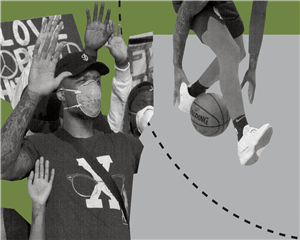A postgame interview offers a reminder that the spectacle of public life is best backed up with real work.
賽后的采訪提醒我們,壯觀的公眾生活是由真正的工作來支撐的。
By Jason Zengerle.
文/杰森·曾格爾
The scene is so familiar that it's practically banal.
這個場景太熟悉了,簡直是平談無奇。
Damian Lillard, the Portland Trailblazers' All-Star guard, stands on a basketball court, covered in sweat and breathing heavily, fresh from scoring 50 points to lead the Blazers to a comeback win last month.
波特蘭開拓者隊全明星后衛達米恩·利拉德站在籃球場上,渾身是汗,喘著粗氣。上個月,他剛剛拿下50分,帶領開拓者隊逆轉勝利。
From a TV studio far away, Dwyane Wade, an All-Star guard turned commentator, asks Lillard how he manages to make commercials, record music, raise three children and still drain 3-point shots from near half-court.
在遠程的電視演播室里,由全明星后衛轉行做解說員的德懷恩·韋德問利拉德,他是如何做到拍廣告、錄制音樂、撫養三個孩子,還能在近半場不停地投出三分球的。
This is where the script calls for Lillard to fall back on the usual jock clichés about thanking God and taking it one game at a time.
劇本要求利拉德回到通常的運動員的陳詞濫調上,如感謝上帝,僅是看做一場比賽。

Instead, he moves in a different direction. “None of those things that you just named would be possible without the work,” Lillard says.
相反,他卻轉移了話題。利拉德說:“如果沒有這項工作,你剛才提到的那些東西都不可能實現。”
“I wasn't a highly touted middle school player, high school player or college player. I had to do my work behind the scenes.”
“我不是一個被高度吹捧的初中球員、高中球員或大學球員。幕后我得做好我的工作。”
He goes on to recall what it was like “to not have the lights on you and to want to be seen” and the methodical process involved in escaping that condition.
他接著回憶起“沒有聚光燈追著你,又卻想被人看到”的感覺,以及擺脫這種狀況的過程。
Then, summoning the underdog spirit of Rocky Balboa and the Protestant ethic of Max Weber,
接著,他引用了洛奇·巴爾博亞的失敗者精神和馬克斯·韋伯的新教倫理,
he says: “I don't forget those steps that it took for me to get here. So even though I got a family and I got all these commercials and these endorsements, I don't forget the thing that makes all of those things possible. Which is the work, the discipline.”
說道:“我沒有忘記我走到今天所經歷的那些步驟。因此,盡管我有了家庭,有了廣告,有了代言,我沒有忘記是什么讓這一切成為可能,那就是工作和紀律。”
譯文由可可原創,僅供學習交流使用,未經許可請勿轉載。











